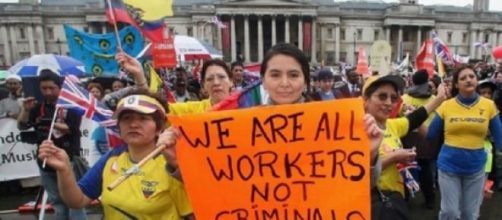As promised in my previous work,I am going to discuss the issues regarding the “quality” of Romanian immigrantsin the UK. Meaning their level of education and the nature of their employment wherethey are able to settle in (which tends to differ substantially oftentimes). To be unequivocal: how productive areRomanians who come to the UK, and in what ways do they become an addition (or sometimes burden) to this society?
NotableRomanians
Firstly, we should take a look at some notableRomanian-born naturalized citizens. There are quite a few businessmen who madetheir name in Britain which includes Botnar (founder of Datsun UK, later NissanUK) or Iacobescu.
Also there are many prominent Romanians who excelled in arts,many in music (Maistorovici, Diana Ionescu,Cojocaru, Sarbu) but in fine arts aswell (Neagu, Cantacuzino, Mirodan). Yet there are a few who need to be mentioned with distinction, first ofwhom is Vera Atkins, recipient of the CBE order thanks to her valuable work for the secret services during WWII.Others include Moses Gaster, a linguist, philologist and lecturer at Oxford, andDavid Mitrany, a notable academic in international relations theory. The listgoes on, but this should be sufficient to show that there were many Romanians whobecame a productive addition to their new society.
RomanianWorkforce today
Now, let’s continue with the current situation, where onefaces many assertions and allegations about the influx of Romanians.
Yes,greater immigration entails a vastnumber of consequences, many of which are negative (as "foreseen" by somedecision makers),but is this the overwhelming formula when one speaks about it in terms ofRomanians? The answer is quite multifaceted! For example, Romania has beenexperiencing negative effects of brain-drain. Doctors, most notably, areconstantly leaving the country which leads to a shortage of doctors there.
Someestimate that there are thousands of Romaniandoctors working for the NHS,thus contributing to its functioning, instead of abusing it…
However, this is not the case for the majority ofimmigrants (just like in any other group, not all of them are highly skilled). Theeasiest way to find jobs is to do some kind of manual labour.
Due to this,there’s a tradition of enticing uneducated people, who barely speak English, to work illegally as day labourers. Thissaves employers a lot of money, as they don't have to pay taxes or insuranceafter them. What’s more frustrating is that they don't need to take safetyissues into account, which leads to many work accidents that go undocumented.Hence safety measures are circumnavigated. Construction sites remain a hub forsuch abusive employers who can be seen picking up groups of men on theoutskirts of cities.
Thetraveling paupers
Lastly, the case of rough sleepers remains a delicate topic. The number of these peoplehas tripled in London lately according to some estimates (490 from 170), which in itself stillisn't a substantial number.
However, many of these rough sleepers demand to behoused, since they claim to be entitled to it as EU citizens. Whilst sleeping in underpasses and metro stations,they are literally becoming an obstacle for the daily movement of locals. Moreimportantly, when they are sleeping on the streets of the city centre, they aredamaging local chic businesses by deterring potential customers. Yet, hereone has to note that the majority of rough sleepers are usually Romas …whoselifestyle is similar in Romania as well.

